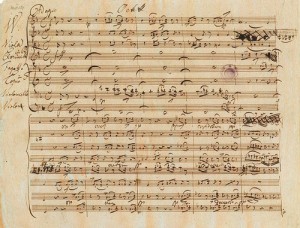
The young woman sang some English pieces at her graduate voice recital. When it came to her selection of German lieder she gave an introduction, “I have no idea what these songs are about.”
Dore, who is a music DJ, says when he auditions a CD, the music comes first and foremost. With music coming from all over the world, it is nearly impossible to know the meaning of each song that he favors, even when the lyrics are printed on a separate pamphlet. Rightly so, Tangents is a music program, not a poetry reading. But as a singer it is imperative to understand the text. Music is not just notes but story-telling and we can’t tell a story without knowing what it is about. I wonder if the young woman was graduated.

Lou Harrison remarked to me once that in music you can commit murder–because no one really knows what you’re about. But yes, song involves words, and even if the music tells a story of its own, the words direct our attention to particular concepts and events. Who would know that “Love for Sale” was a song about a prostitute if it weren’t for the words? For Brecht and Weill, as well as for Cole Porter, the emotional qualities of the words are sometimes set deliberately *against* the emotional qualities of the music. There, if you listen only to the music, you won’t understand the song. But there are people who fly from words.
Though I know that there are probably poetic traditions that actually prohibit the musical, I personally believe and define poetry as that art which exploits the music inherent in language through the precise evocation of the image. That’s it for me, pure and simple. The practice of that though is far from pure and simple. I don’t think you can speak of poetry and music separately; music is an essential. We’re all trying, and some of us are lucky enough, to discover our modes. I think mine is a bluesy melodic minor or a mixolydian. Frost talked about it as the sound of sense, how you can hear and understand the emotional, tonal sense of a conversation through a door without hearing the words. I think he’s speaking to a musical component. The Greek had it done pat in their prosody, the accentual, rhythmic, and the quantative, the melodic. Quantity has to do with the length and weight of vowels; the elongation and emphasis of vowel sounds is song. Poetry is music (of the muse).
While you don’t have to know the meaning of the words you sing in order to sing them, nor do you need to understand how to play or compose music in order to sing along with it, I believe that the more you know about what you’re doing, the more your focus and intent will be evidenced in your output and the more the audience will notice and appreciate what you have to offer. I don’t think it was particularly wise to make the admission she made in view of the fact that she probably did not have to and there was something at stake. I wonder, did the young woman “meet standards?”
I listen to lots of foreign lyrics and while good to see translations, what is most important to me is whether the singer moves me. Soulfulness transcends language – emotion cuts through all.